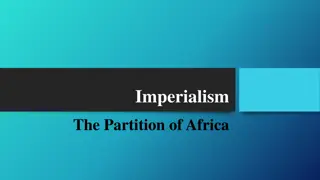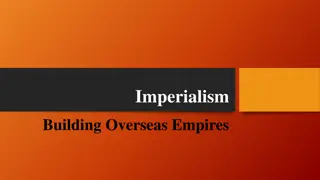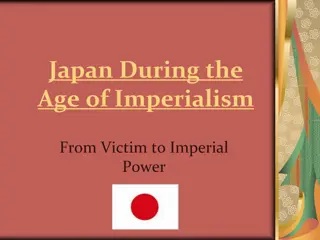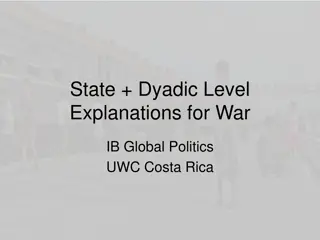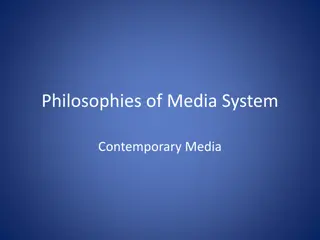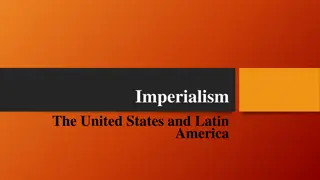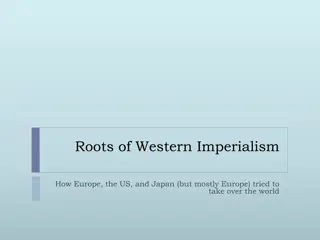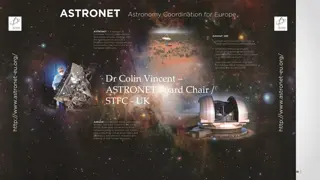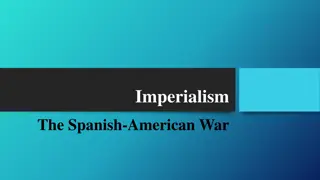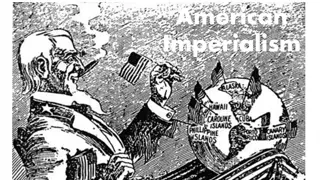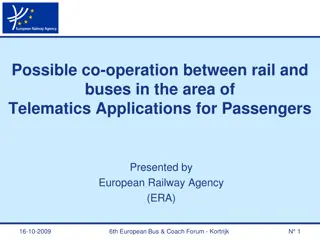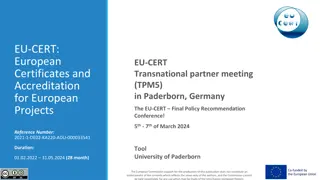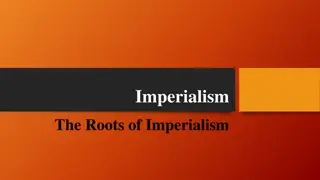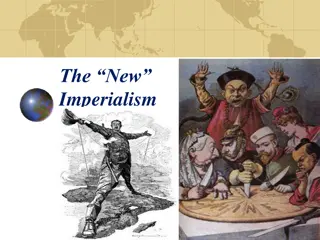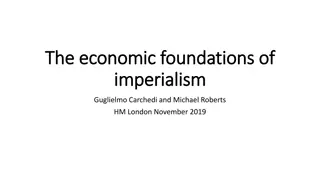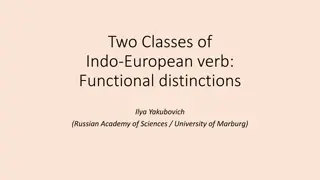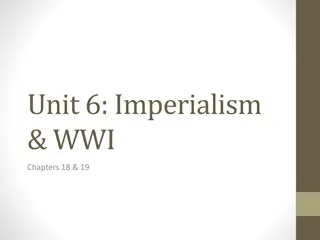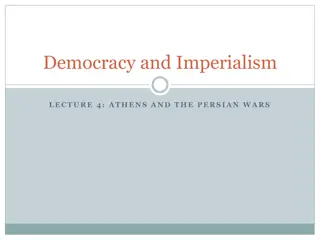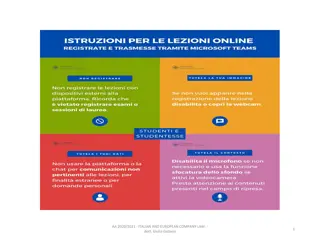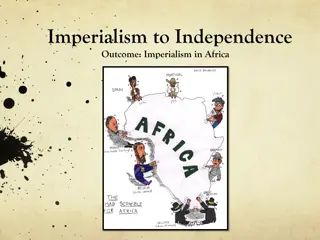Exploring the European Union and its Opportunities for Young People
The European Union (EU) is a political and economic union of 27 member states supporting lasting peace, human rights, freedom, and the free movement of people, goods, services, and capital. For young people, the EU offers job opportunities, youth events, travel and study opportunities, and initiativ
1 views • 18 slides
European Institutional Response to COVID-19: Coordinative Europeanisation and Policy Recommendations
Dr. Stella Ladi from Queen Mary University of London and Panteion University, Athens, presented on the Coordinative Europeanisation during poly-crisis and the EU's institutional response to COVID-19. The presentation highlighted the recovery and resilience facility, the Schengen Area, and the import
0 views • 9 slides
European Imperialism and the Division of Africa in the 19th Century
European countries like Britain, France, and Germany began claiming African territories in the late 1800s, impacting indigenous populations and leading to various resistance movements. The Berlin Conference resulted in superimposed boundaries, affecting trade and resources. Islamic influences expand
0 views • 19 slides
Advancing Digital Transformation Through European Digital Identity Wallet Initiative
Facilitating digital transformation through the European Digital Identity Wallet initiative is crucial for enhancing trust, privacy, and security in online interactions. By prioritizing user-friendly solutions, data control, security measures, and inclusive implementation, the initiative aims to pro
1 views • 6 slides
European Imperialism in the Late 19th Century
European nations in the late 1800s pursued imperialism to expand their empires for economic, political, and social reasons. Motives included economic interests, political and military ambitions, and the ideology of Social Darwinism. The Industrial Revolution fueled the need for resources and markets
1 views • 14 slides
Japan's Transformation During the Age of Imperialism
Japan's journey during the Age of Imperialism saw it transition from isolationism to becoming an imperial power. From strict order under the Tokugawa shoguns to the Meiji Era's rapid modernization, Japan adopted Western influences to reform and militarize. The Treaty of Kanagawa in 1854 marked the e
1 views • 20 slides
Examining State-Level and Dyadic Explanations for War in Global Politics
Understanding the reasons why certain states are more war-prone than others involves exploring factors such as economy, internal opposition, and political systems. Marxist explanations argue that capitalist economies are more prone to war due to issues like overproduction, wealth inequality, and imp
0 views • 17 slides
Democracy and Rule of Law Transformations in the European Union
Democracy and the rule of law in the European Union are facing challenges such as backsliding and low voter turnout. This article discusses tools the EU can use to address these crises, ways to strengthen the link between the European Parliament and its citizens, factors affecting voter turnout in E
0 views • 10 slides
Understanding Media Imperialism and Cultural Influence
Explore the concepts of cultural imperialism, media imperialism, and theories of communication in contemporary media systems. Cultural imperialism involves the influence of powerful cultures on less dominant ones, impacting cultural identity. Media imperialism refers to the one-way flow of informati
0 views • 12 slides
Overview of ECFA-UK: European Committee for Future Accelerators and its Activities
ECFA-UK, the European Committee for Future Accelerators, consists of members from prestigious institutions in the UK like Oxford, Edinburgh, Bristol, RAL, Glasgow, Cambridge, and UCL. The committee's main objective is to assess and ensure the well-being of the particle physics field in Europe and en
1 views • 11 slides
Understanding Colonialism and Imperialism in Modern History
The discussion revolves around the impact of colonialism and imperialism on international relations, focusing on the historical context, economic consequences, and nationalist movements against colonial powers. Highlighting key players such as Great Britain, France, and Germany during the 19th centu
2 views • 14 slides
Exploring Early American Civilizations and European Impact
Discover the Columbian Exchange, Early American Civilizations like Aztec, Inca, and Maya, Inca civilization characteristics, European Exploration impact on Native Americans, and motives for European Expansionism. Learn about technologies aiding European exploration and the economic concept of mercan
0 views • 26 slides
Orientalism and Imaginative Imperialism in the Arabian Nights
This content discusses the intertwining of Orientalism, imperialism, and literature in works like "A Thousand and One Nights" (The Arabian Nights). It explores how intellectual and cultural energies influenced the imperialist perspective and translation of these texts, revealing deeper insights into
0 views • 8 slides
United States Imperialism in Latin America
United States' involvement in Latin America, particularly in Puerto Rico and Cuba, post-Spanish-American War, showcased a shift towards imperialism. Policies such as the Foraker Act and the Platt Amendment highlighted American efforts to exert influence in the region, leading to mixed reactions from
0 views • 25 slides
European Colonial Encounters 1750-1914: Paths to Imperialism
Second wave European conquests in the 18th and 19th centuries saw a shift towards informal control and military force in establishing empires in Africa and Asia. Various paths to colonial status emerged in India, Indonesia, Australia, and New Zealand, reflecting different colonization methods and ou
0 views • 21 slides
European Imperialism in the Middle East: A Historical Overview
Empire of the Turks and the 18th-century Ottoman Empire played significant roles in the power dynamics of the region, with conflicts over control of the Black Sea and territories. Napoleon's expedition into Egypt further intensified European interest in the Middle East, impacting trade routes and re
0 views • 41 slides
Unveiling the Roots of Western Imperialism: Europe's Quest for Global Domination
Exploring the origins and impacts of Western imperialism by examining how Europe, alongside the US and Japan, sought to exert control over various regions, particularly focusing on Africa. The process of colonization, the motivations behind imperialism, and the consequences for the colonized nations
0 views • 13 slides
Institutional Framework and Antitrust Law in the EU
The European Union's institutional framework is defined by the Treaties of Lisbon, European Union, and Functioning of European Union. These treaties establish the EU's objectives, governance principles, and delineate competences. Additionally, EU antitrust law principles are based on the Treaties of
0 views • 16 slides
American Imperialism in the Late 19th Century
Perception of manifest destiny, economic motives, and racial theories drove American expansionism in the 1890s, leading to overseas markets, acquisitions after the Spanish-American War, and debates over imperialism. Key figures, events, and ideologies shaped America's rise as a global power, includi
0 views • 13 slides
Comprehensive European Astronomy Development Planning by ASTRONET
ASTRONET, a group of European funding agencies and infrastructures, coordinates all aspects of European astronomy. Established in the early 2000s with EU funding, ASTRONET focuses on long-term planning for the development of European astronomy. It has created the European Science Vision and Infrastr
1 views • 7 slides
Unit Assessment Review: U.S. Imperialism History Lesson
Review session for upcoming history unit assessment on U.S. Imperialism. Topics covered include key events such as the Philippines under American control, reasons for Mark Twain's anti-Imperialist stance, factors driving American foreign policy towards imperialism, the case of Hawaii's Queen Liliuok
0 views • 15 slides
Causes of the Spanish-American War: Imperialism, Cuba, and Yellow Journalism
The Spanish-American War was fueled by imperialism, particularly the desire for colonies, as well as the unrest in Cuba against Spanish rule. American economic interests in Cuba, coupled with yellow journalism's sensationalized reporting, further escalated tensions leading to the conflict.
0 views • 25 slides
Exploration of American Imperialism Through Historical Events
American imperialism, characterized by extending control over weaker regions for economic and political gain, is exemplified through events like Hawaii's annexation and China's Open Door Policy. The impacts of imperialism on native populations, such as Hawaiians and the Chinese, raise questions abou
0 views • 13 slides
Democracy and Imperialism: Origins and Legacy of Classical Athens
The module explores the origins, nature, and legacy of democracy in Classical Athens (508-322 BC), shedding light on the political structures, principles, and impact of Athenian democracy. Topics range from the supreme authority of the Assembly to the accountability of magistrates, providing insight
0 views • 16 slides
American Imperialism in the Late 19th Century
The late 1880s and 1890s saw the United States embroiled in near-wars and diplomatic crises due to American expansionism. This included the annexation of Hawaii despite Queen Liliuokalani's opposition, and the debate over acquiring the Philippines for economic interests. Anti-imperialists argued aga
0 views • 5 slides
WWII Japanese Imperialism and Post-War Japan
Explore the historical narrative of WWII Japanese imperialism, the factors leading to Japanese control of Pan-Asia, interference from the West, rational for Pearl Harbor, and the aftermath including the fall of Japan and the devastating effects of the atomic bombs on Hiroshima and Nagasaki.
0 views • 17 slides
European Railway Agency's Role in Promoting Cooperation between Rail and Buses in Telematics Applications
The European Railway Agency (ERA) plays a crucial role in enhancing cooperation between rail and buses through Telematics Applications. Established in 2004, ERA focuses on recommending legislation, ensuring interoperability, and enhancing safety in the European rail network. Recommendations made by
0 views • 17 slides
EU-CERT: European Certificates and Accreditation for European Projects
The EU-CERT project involves European Certificates and Accreditation for European Projects, with upcoming events like the Transnational Partner Meeting (TPM5) in Paderborn, Germany, and the Final Policy Recommendation Conference in March 2024. The accreditation website tool and related information a
0 views • 4 slides
Understanding the Roots and Causes of Imperialism
The roots of imperialism trace back to the late 19th century when the U.S. transitioned to a major global player, acquiring territories and expanding influence beyond its borders. Economic benefits, such as access to raw materials and gaining a competitive edge, drove nations towards imperialism. Th
0 views • 16 slides
Chinese Nationalist Revolution: Prelude to Internal Tensions and Imperialism Redux
Prelude to the Chinese Nationalist Revolution explores the backdrop of internal tensions and Imperialism in China from 1895 to the early 1900s. The period witnessed a series of revolts against Manchu authority, including the Taiping Rebellion and self-strengthening efforts to adopt Western technolog
0 views • 30 slides
U.S. Imperialism: Acquiring New Lands and Foreign Influence
Explore the impact of U.S. imperialism through the acquisition of territories such as Puerto Rico and Cuba following the Spanish-American War. Discover the control exerted by the U.S. over these regions and how it influenced local governance. Delve into U.S. economic interests in Cuba and foreign in
0 views • 9 slides
The New Imperialism - Historical Overview of European Colonization
Explore the era of the New Imperialism through descriptions of North Africa, Egypt, Belgian Congo, and American missionary accounts. Learn about the impact of imperialism on various territories and the atrocities committed in the pursuit of resources and control.
0 views • 27 slides
Global Interactions and Imperialism in the 18th and 19th Centuries
This content covers colonial encounters in Asia, Africa, and Oceania from 1750 to 1950, focusing on the impact of European imperialism. It delves into the economic, political, and social dynamics of this period, highlighting factors such as linguistic separation, social Darwinism, and the consequenc
0 views • 11 slides
Economic Foundations of Imperialism: Exploitation and Value Transfer
Imperialism primarily functions as an economic mechanism for exploiting value rather than seeking political dominance. The transfer of value occurs through mechanisms like unequal exchange, global value chain flows, and capital flows, leading to the long-term appropriation of value by imperialist na
0 views • 28 slides
Functional and Lexical Distribution of Indo-European Verbs
Investigating the functional and lexical distribution of Indo-European verb classes, this research delves into the mi- and xa-conjugations in Proto-Indo-European, new discoveries in the preterit of the xa-conjugation, paradigms in Hittite, perfect and middle endings in Late Indo-European, and the ch
0 views • 18 slides
European Deposit Insurance Scheme (EDIS) - Towards a Safer Banking Industry in Europe
The European Commission initiated the European Deposit Insurance Scheme (EDIS) to strengthen confidence in the banking industry in Europe, solidifying the European monetary union. EDIS will be phased in from 2017 to 2024, providing more stability for European depositors and addressing potential pitf
0 views • 10 slides
United States Foreign Policy Evolution from Imperialism to World War I
Explore the United States' foreign policy evolution from Imperialism to World War I, including the Open Door Policy, Dollar Diplomacy, and involvement in the Spanish-American War. Learn about the military actions in acquiring territories such as Puerto Rico, Guam, Philippines, and Hawaii. Delve into
0 views • 8 slides
The Impact of Athens and the Persian Wars on Democracy and Imperialism
The lecture delves into the historical events surrounding Athens and the Persian Wars, highlighting key milestones such as the expulsion of Hippias with Spartan help, Cleisthenes' reforms, and the rise of Archaic Greek imperialism in Athens and Sparta. Herodotus' perspective on the Persian Wars and
0 views • 21 slides
Italian and European Company Law: Key Insights for 2020/2021
Delve into the intricacies of Italian and European company law for the academic year 2020/2021 with Dott. Giulia Gabassi. Explore topics such as European Economic Interest Grouping (EEIG), European legislation, Court of Justice regulations, directives, and uniform models. Understand the importance o
0 views • 88 slides
The Age of Imperialism in Africa: From Imperialism to Independence
The Age of Imperialism in Africa delves into the historical background of European domination, exploring factors such as European motives, societal impact, and the spread of Social Darwinism. It covers the transition from African trade in the 15th to 17th centuries to the eventual independence movem
0 views • 18 slides


